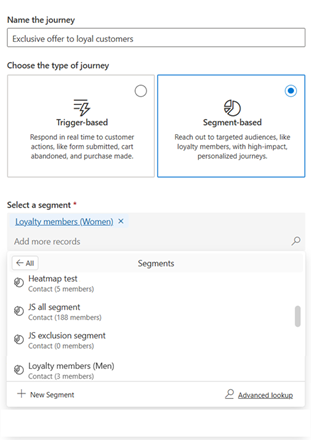Deliver common experience to multiple audiences with single journey
Important
Some of the functionality described in this release plan has not been released. Delivery timelines may change and projected functionality may not be released (see Microsoft policy). Learn more: What's new and planned
| Enabled for | Public preview | Early access | General availability |
|---|---|---|---|
| Admins, makers, marketers, or analysts, automatically |  Oct 21, 2024
Oct 21, 2024 |
- | Feb 2025 |
Business value
Reuse existing segments to deliver a common experience in a single journey—no need to create a new segment for the combined audience.
If you already have segments for different purposes, you can easily create different audiences by using one or more of them in a journey. There's no need to create another segment from scratch, combine existing segments into a composite segment, or make multiple copies of the same journeys. Specifying multiple segments is straightforward and efficient and enables you to create different audiences quickly (no need to use the segment creation role or wait on other team members to create a segment for you). Additionally, the functionality reduces the number of segments that need maintenance or cleanup later and doesn't add to the overall segment limit.
Feature details
Using multiple segments in a single journey, you can:
- Specify up to 15 segments as a journey audience.
- Promote reuse to drive efficiency and reduce errors.
- Use existing segments to create new audiences easily—no need for a segment creation role or expertise.
Scenario: Nina, a marketing manager, has two separate segments, one for men and one for women. She can now reach all of them simply by using both segments in a journey. She doesn't need to create a third segment for the combined audience.

Note
You could already specify multiple segments as exit segments or exclusion segments. This enhancement extends the ability to specify multiple segments to start a journey. Outbound marketing segments can't be used when specifying multiple segments.
See also
Set the journey start (docs)